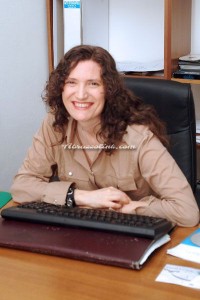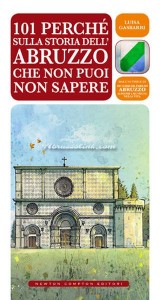AN INTERVIEW WITH LUISA GASBARRI
CHIETI – She writes thrillers, studies Gender relations and teaches creative writing. In 2005 Luisa Gasbarri came to the attention of big publishers with her first work “L’istinto innaturale”(An Unnatural Instinct). She has also produced an anthology of contemporary writers, but it was her books published by Newton Compton“101 cose da fare in Abruzzo almeno una volta nella vita” e “101 perché sulla storia dell’Abruzzo che non puoi non sapere”(“101 things to do in Abruzzo at least once in your life” and “101 things you need to know about the history of Abruzzo”) that brought her unprecedented success and put her in the top ten of Abruzzo experts.
These are works that anyone wanting to visit Abruzzo should not miss reading and we were therefore curious to meet the author to find out how they could be used to promote tourism in Abruzzo.
Luisa, we share this love for this wonderful place that is the Abruzzo, when did you start to gather knowledge about your region and why did you decide to do it as a “divertissement da flaneur”?
When Newton Compton chose me to write “101 things to do ..” they were looking for someone who could talk about our territory from the point of view of a writer rather than a journalist or academic. Perhaps only an artist has the ability to capture the particular in everything, the flavour, a colour, a shade …
The main aim is to speak to the readers’ emotions. The 101 books are actually an alternative type of guide book that involve and entertain the reader in a breezy way, but at the same time are underpinned by rigorous research. The first volume was much appreciated, and I am very grateful to those who have spread it throughout the world, because The Abruzzo is not just a region in Italy but a type of spirit and character, and those who were born here, or who have, like me, lived here for a major part of their lives, know what that means. There is an “abruzzeseness” in everyone’s heart that for some unknown reason remains untainted, so when I was asked to write a new 101, about its history, my idea was to reawaken the past, search through the mists of time to give life to the here and now, in a manner as simple but as alluring as possible.To write in this way, trying to put an original twist, to many proud and knowledgeable Abruzzesi is a delicate operation, but at the same time it keeps me on track. The more you tell the more you realise there is so much you can’t write about, and so the style of the book is naturally modelled on the “divertissement da flaneur”. True, it becomes a rambling walk through time, but one which sets the mood for the surprises that only a trip through time can offer and the more alluring paths are always those momentously the most unpredictable.
To get out of the crises, not just the economic one, of the moment, what do you think can best pave the way for Abruzzo tourism, its natural beauty or architectural heritage?
I think both are diverse and precious resources for tourism and the territory has great potential that is too often still not being well used. The Abruzzo is blessed with a beautiful coastline, superb mountains and marvellous national parks full of rare plants and wildlife. Add to this the excellent gastronomy and you have numerous itineraries to offer to suit various enthusiasts. To get out of a crisis can also mean that one needs to enhance and highlight the best features and avoid wasting, perhaps what is really essential, in this case the presence of young people with willingness, enthusiasm and ability to promote tourism. The expansion of the petroleum business sector is a risky and restrictive choice with a much lower long term productivity than that which could be guaranteed by a better protected and politically supported tourism.
Many readers write to me surprised to have discovered aspects of the Abruzzo that have been ignored for so long, beautiful places, glorious historic events, old and mysterious folklore, works of art, traditional food, and historical figures who have remained unknown even to many of our fellow Italians. So as not to lose our regions wealth of history we must enthusiastically hand it down to the next generation, not just for curiosity’s sake, in passing, but as knowledge that can incorporate itself into the inconsistent, overabundance of information which modern society suffers from. Another crisis is the “smoothing out” of culture and the loss of individuality and all forms of particularity. As the saying goes “love is the offspring of knowledge”, therefore to really know our land allows us to truly respect it, to love it.
Do you think the closeness of the sea and the mountains is our winning card for re-launching tourism?
The variety of our landscape, as I have articulated in my books, cannot be summed up just by the ability to encapsulate the sea and the mountains in one panorama, even though it does capture the spirit. The lakes, canyons, cycle tracks between the villages or through the national parks, the protected marine-life areas, soaring cliffs, silver sands, the Gold Coast, and the ghostly, tucked-away inland villages; the charming, illustrious caves, the magical mystery tours that one can take to the silent peaks or through the forests of the Apennines, all offer incomparable life experiences. Not to mention the cultural events, that year by year are becoming bigger and better and in no way shaded by those in other parts of Europe that are given more acknowledgement.
It is our turn to re-launch tourism and Abruzzo’s ace up its sleeve is our capacity to enhance, promote and care for all of our treasures, to all be involved in fruitful, all encompassing, permanent planning.
A major obstacle to the current boom might be the inability of the Abruzzese to work as a team. The farmer, the shepherd, the fisherman, the artisan, are all highly individual professions, the difficulty being that children and grandchildren might form a critical mass.
This is, unfortunately, a sickness of the Belpaese (Italy). It has always been divided, not just geographically, but also by guilds and corporations, from medieval times to now. With all due respect to Voltaire, we Italians cultivate our skimpy garden, and often forget, stubbornly entwined in our own little world, to be otherwise. An opportunism that imperial capitalism has imposed and for worse in recent decades. However there is no unbridgeable gap between children and grandchildren, think about the number of grandchildren of emigrants that are now rediscovering their roots, re-embracing family traditions linked to their grandparents rather than their parents, or the number of youngsters now choosing to take up artisan skills or work in agriculture, with a new-age spirit, green mentality, rampant crowdfunding, in a stunning coming-together of age old cycles and innovative future tendencies.
The wolf or the bear, what’s our best emblem?
I have written about this at length in my 101s. Both are romantically complex, wild and fascinating, even if for different reasons. However at this moment in time fingers are pointing at the wild boar, not for parochialism but because, as I’ve pointed out in my most recent book, the boar is a symbol of tenacity and courage. It persists and resists, overcoming unlikely environmental conditions. Selected as a symbol for those who clench their teeth, which nowadays is all of us, and who know their enemies particularly well.
Fante, Rossetti, d’Annunzio, Silone, Mattioli, Janni, Tita Rosa, Capograssi, Flaiano all found fame far from Abruzzo, but there have been poignant returns and outpourings of feelings. Is this other Abruzzese characteristic, the riotous externalising of emotions, a reason for slower tourism?
I have travelled a lot and can confirm and assure you that the Abruzzo’s hospitality is renowned throughout Italy and abroad. The Abruzzese people are kind, courteous, open, helpful, imaginative, dynamic, resolute, shrewd, determined, prudent and constructive. They are also stubborn, for sure. Many a time in history they’ve had to roll their sleeves up, who can forget “La Fierezza Sannitica” (A group of Abruzzese shepherd/soldiers who fought the Romans)? The sacrifices of those in the L’Aquila region who have had to rebuild their homes after yet another earthquake? And let’s not forget the lengths to which resistance was held, by men and women, during wars throughout history.
This spirit of resilience has made us a bit hasty, perhaps, and unreserved, but at the same time discrete and not inclined to fancy demonstrations of affection. Those who gallantly struggle for centuries learn how to keep their feelings a secret, deep in their hearts, but it’s the true greatness of the heart that makes the difference.
The book “101 perchè sulla storia dell’Abruzzo che non puoi non sapere” can be purchased in any bookshops or even online both in paper and e-book .
(*) translated by Gail K.
“I fell in love with Italy in my early 20s, in the early 1980s, when I lived in Abruzzo, in Chieti, for four years. My passions are numerous and include food, film, fun and football. I also love wine, reading, travelling, music, nature, skiing, swimming, horseriding, etc. My academic background is Sociology (BA), Early Childhood (MA) and TEFL. I am now a semi-retired English Teacher, living in Italy with 6 cats; my two sons, in their 20s having flown the nest.”
(*) translated by Gail K.







